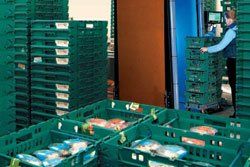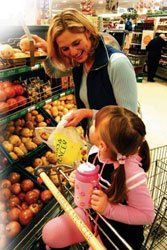Our Products
Latest News
NZ HortBin hits NZ shores
Click here to read more..
Viscount Plastics cleans up at the Pampito Awards
Click here to read more..
Viscount Plastics is the proud winner of the Chartered Institute of Logistics and Transport's prestigious "Safety, Security and Environmental Innovation" award for 2010.
Click here to read more...
New Zealand linked to supply chain innovation at Marks & Spencer
Viscount Plastics New Zealand’s parent, LINPAC Group, has played a key roll in helping UK’s Marks & Spencer build a new ‘fresher and better quality’ produce supply chain based on 3.5 million returnable delivery trays implanted with RFID tags.
Claimed to be the world’s largest supply chain application of Radio Frequency Identification (RFID), the technology was developed and its implementation managed by the LINPAC Group owned Intellident. The rollout was regarded as significant on several levels.
Few Journeys
In the early 1970’s Marks & Spencer began using returnable plastic produce delivery trays; a decision saving around 30,000 tonnes of cardboard annually. Illustrating their shared environmental values and packaging minimisation objectives, LINPAC re-used the old imperial size Marks & Spencer plastic produce trays as raw material for the metric RFID tagged trays. The switch to full and half size metric trays was in part a logistics strategy to achieve a 33% improvement in vehicle fill efficiency and ultimately a reduction in the number of road journeys. By nesting to just 36% of their height the new trays are also contributing to fewer empty tray road journeys.
The RFID tags implanted in the trays and new interlinkable double-size dollies -- also developed and manufactured by LINPAC -- allows real-time monitoring and product visibility across the very busy and highly automated Marks & Spencer supply chain. The new trays are easier to machine pack and stack allowing suppliers to improve their operational efficiencies.
On delivery to the Marks & Spencer Distribution Centre, trays and dollies pass through an Intellident portal that automatically reads supplier, product and other information contained on each re-writeable RFID tag. Because trays are scanned together, reading and information retrieval is done at a speed six times faster than for barcoding where each tray must be scanned individually.
Greater Choice
Rewarding Marks & Spencer customers with fresher and better quality food at the point of sale is at the heart of improving speed and efficiency of supply. Many customers are also benefiting from greater choice. Introducing a half size to the returnable produce tray pool is giving smaller Marks & Spencer outlets the flexibility to order smaller quantities and therefore expand product lines with far less risk of wastage. For large supermarkets, the interlinkable dolly doubles the amount of product brought into the store in a single trip. Both sizes of tray stack efficiently onto the new dollies which means they pass along the supply chain from supplier to store shelves without the need for destacking.
Wash Centres
Once emptied, the trays and dollies are taken to wash centres where the design of the trays allows automated equipment to de-nest, handle and cleanse trays to a standard that maximizes quality and presentation when next seen by customers in store.
As a wholly owned LINPAC Group company, Viscount Plastics New Zealand is a conduit to supply chain and other packaging innovations achieved by or involving LINPAC Group companies throughout the world. Viscount Plastics New Zealand also reflects the same high levels of client commitment that saw LINPAC Group keep the Marks & Spencer project on track, on budget and on time.



